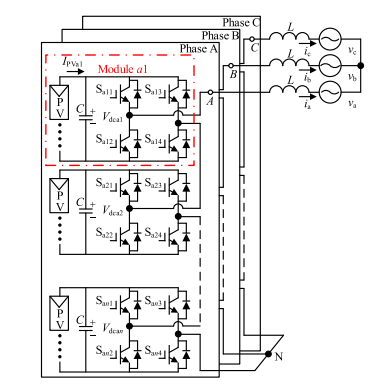A Grid Frequency Support Control Strategy of the Three Phase Cascaded H Bridge Based Photovoltaic Generation System
Also Available Domains Multilevel Converters
Project Code :TEPGPS550
Objective
The main objective of this project is to improve the grid frequency stability in a grid connected solar PV system
Abstract
The Cascaded H-bridge (CHB) inverter has become
a promising candidate for the PV generation system by virtue of advantages such
as modular structure and direct grid-connection without power frequency
transformers. An inverter control strategy with grid frequency support function
is proposed in this paper for the three phase CHB based PV generation system.
With the PV string active power reserve, grid frequency dynamic characteristics
are improved without energy storage devices. In order to solve the common
module power unbalance problem for the CHB topology, the PV string output power
is controlled to be balanced with the reserved power distribution control
between PV strings proposed in this paper. The H-bridge inverter input power
balance is maximized, and balanced three phase grid-connected current output is
achieved. The overmodulation risk of H-bridge modules is reduced. At last,
simulation models are built in Matlab/Simulink.
Keywords: Active power reserve, cascaded H-bridge inverter, frequency support, and photovoltaic power generation.
NOTE: Without the concern of our team, please don't submit to the college. This Abstract varies based on student requirements.
Block Diagram

Specifications
Software Configuration:
Operating System : Windows 7/8/10
Application Software : Matlab/Simulink
Hardware Configuration:
RAM : 8 GB
Processor : I3 / I5(Mostly prefer)
Learning Outcomes
- Introduction to Matlab/Simulink
- What is EISPACK & LINPACK
- How to start with MATLAB
- About Matlab language
- About tools & libraries
- Application of Matlab/Simulink
- About Matlab desktop
- Features of Matlab/Simulink
- Basics on Matlab/Simulink
- Introduction to controllers.
- Study of PWM techniques.
- Project Development Skills:
- Problem analyzing skills
- Problem solving skills
- Creativity and imaginary skills
- Programming skills
- Deployment
- Testing skills
- Debugging skills
- Project presentation skills
- Thesis writing skills
Demo Video
Related Topics


 Paper Publishing
Paper Publishing
